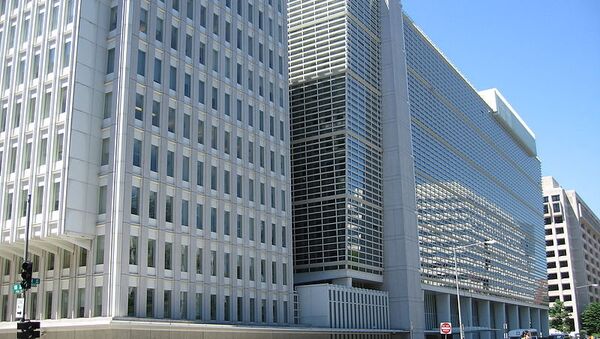MOSCOW, September 25 (RIA Novosti) – The World Bank cut its 2013 growth forecast for the Russian economy in a new report published Wednesday, asserting that domestic consumers had followed investors in “sitting on the fence” over the economy and warning that structural reforms would be necessary to stimulate new growth.
Russia’s economy will expand by 1.8 percent this year, the World Bank said, down from the 3.3 percent it predicted in February. The World Bank’s forecast puts it in line with other major international organizations, as well as the Russian government, that expect 2013 to see the lowest level of economic growth in Russia since the 2009 recession as investment in the economy falls, and demand for Russian exports contracts.
“The recent economic tendencies in Russia are quite alarming,” Mikhail Rutkovsky, head of the World Bank in Russia, told reporters Wednesday.
The Russian government officially predicts 1.8 percent growth this year, while the International Monetary Fund said in a new report published Tuesday that the country will achieve just 1.5 percent growth. The Russian economy expanded 4.3 percent in 2011, and 3.4 percent last year.
The slowdown is due to global headwinds, including a slight fall in the oil price and a loss of momentum for global trade, as well as weakening of domestic consumption and a tapering off in Russian investment activity as large infrastructure projects like the Sochi 2014 Winter Olympics and the North Stream gas pipeline approach completion, the World Bank said.
“While investors were already in a wait-and-see mode... consumers now appear to have joined them and the players in the Russian economy are sitting on the fence,” the report said.
The World Bank expects growth in Russia to begin to pick up slightly in the final quarter of this year, and predicts that in 2014 it will be 3.1 percent. The report, however, emphasized that without structural economic reform, growth is likely to be kept below a glass ceiling.
Despite the slowdown, the unemployment rate in Russia remains low, and the capacity utilization of the economy in the first six months of 2013 was almost 80 percent, the World Bank said.
“At the moment we see an economy where the binding constraints are more and more becoming structural issues,” said Birgit Hansl, the World Bank’s senior economist in Russia. “Basically 2 or 3 percent growth is as best as is possible at the moment.”


